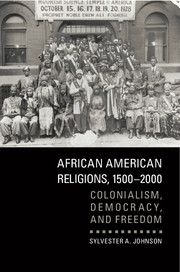Book contents
1 - Black Atlantic Religion and Afro-European Commerce
from PART ONE
Published online by Cambridge University Press: 05 August 2015
Summary
The merchants and political elites of West Central Africa began to establish commercial trade relations with Lisbon (the Portuguese) in the mid-fifteenth century and, in subsequent decades, with other European metropoles. In so doing, they were setting in motion a series of market formations, trade networks, and commoditizing processes that would prove profoundly generative and transformative for Black religion. This commercialism was pivotal because it established the intersection of Atlantic religion and empire, and it features centrally in the first section of this chapter.
Of central importance are the means and motivations of African and European merchants who participated in imperial practices of commerce. Their reasons essentially derived from the fact that the colonial relations of transoceanic empire were highly generative of the commercial aims to which these business agents aspired. Colonialism, in other words, uniquely enabled the expansion of old trade networks in Africa and the creation of new ones connecting to Europe, and this guaranteed an unprecedented scale of lucrative opportunities for trade throughout Atlantic geographies. Trade and profit thus were inextricable from the architecture of Atlantic empire.
The rise of Afro-European commerce consequently instigated new religious formations within the social, political, and economic structures of colonialism. This requires attention not so much to the so-called marketplace of religion but to the market (i.e., the commercial practices of commodities exchange) as a central factor in constituting new formations of Black religion. The public career of the African Anglican priest Philip Quaque is a telling example of this development because his religious experiences emerged within the larger context of commercial interests. So, after accounting for the nature and scale of commercialism, this chapter culminates in an account of Quaque's career to explain major transformations of Black Atlantic religion at the point of intersection with empire.
- Type
- Chapter
- Information
- African American Religions, 1500–2000Colonialism, Democracy, and Freedom, pp. 13 - 55Publisher: Cambridge University PressPrint publication year: 2015



